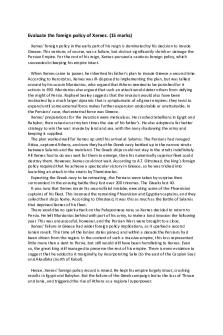Xerxes\' administration of his empire - answer PDF

| Title | Xerxes\' administration of his empire - answer |
|---|---|
| Author | Daniel Kassem |
| Course | History: Ancient History |
| Institution | Higher School Certificate (New South Wales) |
| Pages | 1 |
| File Size | 42.8 KB |
| File Type | |
| Total Downloads | 116 |
| Total Views | 138 |
Summary
Download Xerxes' administration of his empire - answer PDF
Description
How did Xerxes administer his empire? (10 marks) Xerxes is portrayed in Greek histories as a weak monarch who launched an insane attack upon Greece. However, in Persian records he is presented quite differently. He is seen as a great administrator who brought progress to the empire. The truth would appear to be a combination of both these views. Undoubtedly, Xerxes’ greatest achievement as an administrator was the construction of the Persian capital, Persepolis. Though it was his father Darius who laid out the plans for the city, Xerxes himself oversaw most of the building. Xerxes was also an able king politically – certainly for most of his career. Control of the empire was maintained by the 23 satraps, who ruled on Xerxes’ behalf. They were responsible for tax collection, provision of soldiers and the maintenance of peace. Xerxes wisely appointed members of the royal family to many of these positions, ensuring their personal loyalty to him, and maintaining efficient administration of the empire. One such appointment was his brother Achaemenes, who was made satrap of Egypt following a serious revolt there. Another area of administration where Xerxes made a contribution was the Persian road system, which maintained communications across the empire. The ‘royal road’ was the centrepiece of this system. It ran from Susa in the Persian heartland to Sardis in Asia Minor. Feeder roads connected to this, making the fastest communication system in the ancient world at that time. Xerxes maintained and improved on this system. The Persian economic system was based on agriculture, trade and tribute. It was facilitated by a system of standardised coinage, weights and measures. Imperial revenues were collected either in monetary form (gold or silver) or in the form of goods such as grain, horses or cattle. The historian A.T. Olmstead suggests that taxes became ruinous in the later years of Xerxes’ rule, and that the gold and silver collected by the Great King was kept in storage, resulting in a severe shortage of coins. This adversely affected trade and, in consequence, prosperity. Olmstead also believes that Xerxes became increasingly susceptible to “harem intrigues” as his reign progressed, weakening his effectiveness as king. By the end, he had fallen under the influence of his uncle Artabanus, who was commander of the palace guard, and his chief eunuch Aspamitres. Both these men conspired in his death....
Similar Free PDFs

Xerxes\' foreign policy - answer
- 1 Pages

Central Administration of Akbar
- 6 Pages

Administration of Justice
- 3 Pages

Routes of Administration
- 3 Pages

Breakup of The Roman Empire
- 4 Pages
Popular Institutions
- Tinajero National High School - Annex
- Politeknik Caltex Riau
- Yokohama City University
- SGT University
- University of Al-Qadisiyah
- Divine Word College of Vigan
- Techniek College Rotterdam
- Universidade de Santiago
- Universiti Teknologi MARA Cawangan Johor Kampus Pasir Gudang
- Poltekkes Kemenkes Yogyakarta
- Baguio City National High School
- Colegio san marcos
- preparatoria uno
- Centro de Bachillerato Tecnológico Industrial y de Servicios No. 107
- Dalian Maritime University
- Quang Trung Secondary School
- Colegio Tecnológico en Informática
- Corporación Regional de Educación Superior
- Grupo CEDVA
- Dar Al Uloom University
- Centro de Estudios Preuniversitarios de la Universidad Nacional de Ingeniería
- 上智大学
- Aakash International School, Nuna Majara
- San Felipe Neri Catholic School
- Kang Chiao International School - New Taipei City
- Misamis Occidental National High School
- Institución Educativa Escuela Normal Juan Ladrilleros
- Kolehiyo ng Pantukan
- Batanes State College
- Instituto Continental
- Sekolah Menengah Kejuruan Kesehatan Kaltara (Tarakan)
- Colegio de La Inmaculada Concepcion - Cebu










